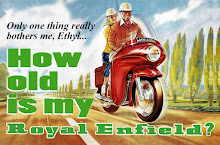 |
| Poem remembers a soldier and his Royal Enfield motorcycle. |
Simon Taylor of the UK signs himself Scaleyback. He posted his poem "Service Brown" in June on a number of Royal Enfield forums in remembrance of D-Day, 1944.
It wasn't his first poem on the subject of Royal Enfields. You can see his extensive collection of original Royal Enfield inspired poetry at this link.
It never says so in "Service Brown" itself, but the motorcycle in the poem is a Royal Enfield, according to Scaleyback's description: "A WWII tale about a despatch rider and his Royal Enfield Motorcycle."
But whatever the make, in whatever branch of whatever allied nation's service, the loyalty of machine to rider and rider to machine reads as an allegory. Soldier and machine repeatedly do more than seems possible when nothing more could have been asked.
You can download the entire poem as a pdf file from this link on the Royal Enfield Yahoo Group.
On that forum I asked the author if the story was true, or "artistic license."
He replied: "Partly artistic license, but as close to the reality as possible."
If so, it's truly special, as the Royal Enfield dubbed "Memo" survives evacuation from Dunkirk and returns to Europe at Normandy, then follows its rider into civilian life in a fresh coat of "Service Brown" paint.
Tuesday, Nov. 11 is Veterans Day in the United States. The date corresponds to the Nov. 11, 1918 armistice that ended World War I. The holiday was originally called "Armistice Day."
In 1954, after World War II and the Korean War, the name was changed to extend the honor to all who serve and sacrifice in times of war and peace.
Author Simon Taylor told me that in "Service Brown" he "wanted to write something that was not only based on the correct historical events, but also showed the relationship between Johnny and his RE whilst adding the very real hopes and fears that servicemen felt in the differing situations that they found themselves in."
Although "not anywhere near old enough to have been in the Second World War," Taylor did serve in the Royal Corps of Signals, which gave him the "Scaleyback" nickname. Signalers of the First World War lugged leaky lead acid radio batteries into battle, resulting in burns that looked like scales.
"The rest of the army ended up giving us the term ’Scaleybacks’ and it is still used today," he told me.
























No comments:
Post a Comment